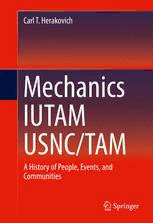
Mechanics IUTAM USNC/TAM: A History of People, Events, and Communities PDF
Preview Mechanics IUTAM USNC/TAM: A History of People, Events, and Communities
Carl T. Herakovich Mechanics IUTAM USNC/TAM A History of People, Events, and Communities Mechanics IUTAM USNC/TAM Carl T. Herakovich Mechanics IUTAM USNC/TAM A History of People, Events, and Communities Carl T. Herakovich University of Virginia Charlottesville , VA , USA ISBN 978-3-319-32311-4 ISBN 978-3-319-32312-1 (eBook) DOI 10.1007/978-3-319-32312-1 Library of Congress Control Number: 2016938787 © Springer International Publishing Switzerland 2016 T his work is subject to copyright. All rights are reserved by the Publisher, whether the whole or part of the material is concerned, specifi cally the rights of translation, reprinting, reuse of illustrations, recitation, broadcasting, reproduction on microfi lms or in any other physical way, and transmission or information storage and retrieval, electronic adaptation, computer software, or by similar or dissimilar methodology now known or hereafter developed. T he use of general descriptive names, registered names, trademarks, service marks, etc. in this publication does not imply, even in the absence of a specifi c statement, that such names are exempt from the relevant protective laws and regulations and therefore free for general use. T he publisher, the authors and the editors are safe to assume that the advice and information in this book are believed to be true and accurate at the date of publication. Neither the publisher nor the authors or the editors give a warranty, express or implied, with respect to the material contained herein or for any errors or omissions that may have been made. Printed on acid-free paper This Springer imprint is published by Springer Nature The registered company is Springer International Publishing AG Switzerland In memory: Jim Simmonds (1935–2015) Professor of Applied Mathematics and Mechanics at Thomas Jefferson’s University. In the true Jefferson mold, Jim exemplifi ed leadership, scholarship, and citizenship. He was a dear friend and colleague. Photo C redits T he great majority of photos presented in the book were available in the public domain. In many cases, permission was given by the individual to use their photo- graph. A few of the photos required citation. • Bernoulli—painting by J. R. Huber • Cauchy—Lithography after painting by Jean Roller • D’Alembert—1763 portrait by Emanuel Handmann • Den Hartog—MIT • Drucker—Courtesy of the University of Illinois Archives, RS 39/2/20 • E hrenfest—portrait—Dibner Library of the History of Science and Technology—Smithsonian • Einstein—photo by Ferdinand Schmutzer • Euler—1763 portrait by Emanuel Handmann • Hetenyi—Society for Experimental Mechanics • Hooke—found by Lisa Jardine, Royal Society • Kirchhoff—U.S. Library of Congress • Koiter—1993 photo by Monique Simmonds • Lagrange—engraving by Robert Hart • Laplace—portrait by Jean-Baptiste Paulin Guérin • Lord Rayleigh—Royal Society of London • Millikan—Getty images • Muskhelishvili—Oil by G. Totibadze • Navier—bust at École Nationale des Ponts et Chaussees • Newton—1689 Portrait by Godfrey Kneller • Poisson—lithograph by François Delpech • Prager—by William C. Klenk, Brown University Portrait Collection • Prandtl—Portrait by unknown author, DLR Archive, Gottingen • Reynolds—1904 painting by John Collier • Southwell—portrait by Henry Lamb, Imperial College vii viii Photo Credits • St. Venant—National Library of France • Timoshenko—Timoshenko Collection, Stanford Library, Stanford, California • von Kármán—The Wind and Beyond: Theodore von Kármán, Little, Brown and Company • von Mises—Konrad Jacobs photo, Creative Commons, Share Alike 2.0 Germany Pref ace T his book reviews the history of the people, events, and communities that led to the development and growth of M echanics , the International Union of Theoretical and Applied Mechanics (I UTAM) , and the United States National Committee on Theoretical and Applied Mechanics (U SNC/TAM) . Initially, I planned to write a book that was a factual history of the USNC/TAM. However, it quickly became apparent that the people involved in the development of the science of mechanics, from ancient time to the present, are vital to any such history. Also, understanding the development of IUTAM is critical to understanding the establishment of the USNC/TAM. My experience includes 20 years on the USNC/TAM, including 12 as secretary (2000–2012) and 18 years as a member of the IUTAM General Assembly (1998– 2016). The years as secretary of the USNC/TAM made me realize that the early history of the committee (prior to 1982) was not well documented. Philip G. Hodge , Jr., who was secretary for the 18 years (1982–2000) preceding my term as secretary did an outstanding job of documenting the information available to him. He also established procedures and policies for maintaining historical records of the com- mittee. Unfortunately, other than what Hodge maintained, it does not appear that a detailed record of the committee activities has survived the test of time. Detailed minutes of meetings are available for the period since the beginning of Hodge’s term in 1982, but little prior to that time. I have expanded on the history before 1982 using newly released data from IUTAM. The book provides a history of the people who have made signifi cant contribu- tions to the development of the science of mechanics, those who developed IUTAM, and those who led the establishment of the USNC/TAM. It serves as a permanent repository giving details of events leading up to the formation of IUTAM (1922– 1924), the establishment of the USNC/TAM (1946–1948), and the leaders and activities of the USNC/TAM during the following 65 years. Special attention is given to the people: who were they, where they came from, and what they contributed. ix
